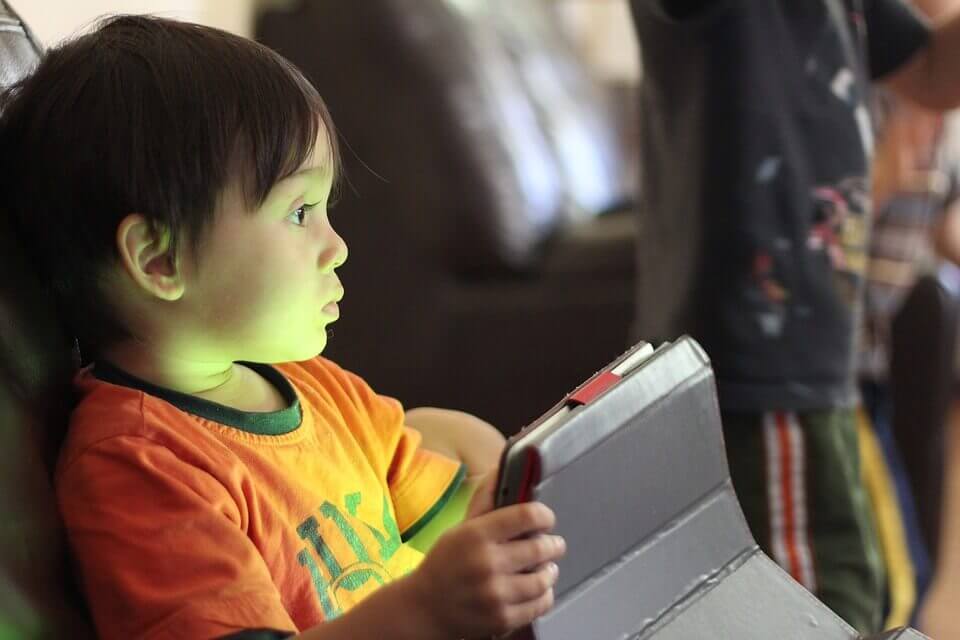How You Can Keep Children Safe Online

One of the biggest challenges that parents face today is how to keep children safe online. From an early age, there are children who have their own tablets, smartphones, and even their own computers. So, it’s difficult to know how they’re using these devices and who they’re talking to online.
Children today are digital natives. They’ve grown up with the internet, and they don’t know life without it. Therefore, they feel totally comfortable with technology. For them, using a mouse or a touch screen to navigate is as basic as reading and writing.
In this article we’ll point out some of the dangers of the internet. We’ll also show you how to protect your children from them.
Above all, most of the tips are common sense. However, there are some small changes that you can make to limit the content and apps on their phone, tablet or computer.
Study on children’s online safety
There’s a recent study from the Oxford Internet Institute (OII) of the University of Oxford. In the study, a group of 515 children aged 12 to 15 years old were interviewed about their experiences on the internet. It showed these results:
- 14% had a negative online experience in the last year.
- 8% had been contacted by strangers.
- Almost 4% had met someone who pretended to be someone else.
- 2% found sexual content that made them feel uncomfortable.
- 3% saw something that scared them.

Keep children safe online: yes or no to parental filters?
A large majority of the parents of these kids, about 90%, either didn’t know what filters they could use or didn’t use any. In addition, bad filters could actually make children more vulnerable.
The OII suggests that, instead of using parental filters, you need to teach your children well. Future research on how to keep children safe online should look at how valuable filters are in the long term. Additionally, they should see if they protect young people over a wider age range.
In the end, choosing to work on better internet education or using filters depends on parents and teachers. It’s not enough to just look through “rose-colored glasses.” Whatever age your children are, it’s important to keep them safe on the internet.
You need rules to keep children safe online
Sometimes it might seem like kids know more than their parents do about the internet. However, it’s your responsibility to keep them safe. As we mentioned, common sense is very important.
To start, we don’t recommend that kids use any device in their room alone. For example, laptops, tablets and smartphones. Asking them to use them in the living room drives away most inappropriate activities.
Talk to your children
In addition, it’s important to talk with each of your children and explain the dangers of the internet. Make sure to explain this in a way that’s appropriate for their age. Also, tell them why they can’t use their devices in their rom.
It’s also important to encourage them to tell you when they see something that bothers them. This includes anything that they didn’t expect.
You have to ask them to tell you if they receive threatening texts or emails. For example, you might be able to just block the sender in the program they’re using.
Clarify things before the next use to keep children safe online
Of course, you need to clarify what’s acceptable online and what isn’t. You need to decide this as parents. You can’t expect children to know they’re doing something wrong if they don’t have limits.
For example, you can tell them not to download applications or files without your permission. Additionally, tell them not to share a file without asking you first.
You also need to decide what instant messaging programs they can use: WhatsApp, Apple Messenger, etc. Also, ask them not to respond to unsolicited emails. In addition, tell them not to register for free accounts without having you check it over.
Online games and how to keep children safe online
When we talk about how to keep children safe online, we’re usually referring to social media issues. For example, common problems are with Facebook, Snapchat and Instagram. However, they shouldn’t even have accounts if they’re under 13. Recent research from Kaspersky labs has found that online games should also be a source of concern.
In a study on children aged 11 to 16, Kaspersky found that 38% of children had met people who pretended to be others on online games. Likewise, 23% had been asked suspicious questions while online.
The scariest statistic was that 20% of the children said they saw people from the platform in real life. In addition, we know that almost a third of the children said their parents didn’t know who they were talking to when they were playing games.
There are some programs that let you control children’s Internet activity. For example, Qustodio is one of them. If you decide to use one, you should tell your children that you’re doing it. It could really hurt your children to find out that you’re secretly watching everything they do.

Facebook and children
When talking about Facebook content, almost everything goes. There are no filters to restrict the content. However, the content on the news feed depends on what friends you have. On Facebook, you can teach them to block individual applications in the settings tab.
In addition, the minimum age to have a Facebook account is 13. Children under this age aren’t supposed to be on it. Many family security software packages available today often have social media features. So, if your children regularly use Facebook, you should check out options, like “Guardian Kids.”
Conclusion on how to keep children safe online
The most important thing to keep children safe online is not to look for high-tech parental controls or spend lots of money. What works best is always to talk to them. Guide your children and show them that they can trust you. This way, they’ll know you aren’t just looking for control.
One of the biggest challenges that parents face today is how to keep children safe online. From an early age, there are children who have their own tablets, smartphones, and even their own computers. So, it’s difficult to know how they’re using these devices and who they’re talking to online.
Children today are digital natives. They’ve grown up with the internet, and they don’t know life without it. Therefore, they feel totally comfortable with technology. For them, using a mouse or a touch screen to navigate is as basic as reading and writing.
In this article we’ll point out some of the dangers of the internet. We’ll also show you how to protect your children from them.
Above all, most of the tips are common sense. However, there are some small changes that you can make to limit the content and apps on their phone, tablet or computer.
Study on children’s online safety
There’s a recent study from the Oxford Internet Institute (OII) of the University of Oxford. In the study, a group of 515 children aged 12 to 15 years old were interviewed about their experiences on the internet. It showed these results:
- 14% had a negative online experience in the last year.
- 8% had been contacted by strangers.
- Almost 4% had met someone who pretended to be someone else.
- 2% found sexual content that made them feel uncomfortable.
- 3% saw something that scared them.

Keep children safe online: yes or no to parental filters?
A large majority of the parents of these kids, about 90%, either didn’t know what filters they could use or didn’t use any. In addition, bad filters could actually make children more vulnerable.
The OII suggests that, instead of using parental filters, you need to teach your children well. Future research on how to keep children safe online should look at how valuable filters are in the long term. Additionally, they should see if they protect young people over a wider age range.
In the end, choosing to work on better internet education or using filters depends on parents and teachers. It’s not enough to just look through “rose-colored glasses.” Whatever age your children are, it’s important to keep them safe on the internet.
You need rules to keep children safe online
Sometimes it might seem like kids know more than their parents do about the internet. However, it’s your responsibility to keep them safe. As we mentioned, common sense is very important.
To start, we don’t recommend that kids use any device in their room alone. For example, laptops, tablets and smartphones. Asking them to use them in the living room drives away most inappropriate activities.
Talk to your children
In addition, it’s important to talk with each of your children and explain the dangers of the internet. Make sure to explain this in a way that’s appropriate for their age. Also, tell them why they can’t use their devices in their rom.
It’s also important to encourage them to tell you when they see something that bothers them. This includes anything that they didn’t expect.
You have to ask them to tell you if they receive threatening texts or emails. For example, you might be able to just block the sender in the program they’re using.
Clarify things before the next use to keep children safe online
Of course, you need to clarify what’s acceptable online and what isn’t. You need to decide this as parents. You can’t expect children to know they’re doing something wrong if they don’t have limits.
For example, you can tell them not to download applications or files without your permission. Additionally, tell them not to share a file without asking you first.
You also need to decide what instant messaging programs they can use: WhatsApp, Apple Messenger, etc. Also, ask them not to respond to unsolicited emails. In addition, tell them not to register for free accounts without having you check it over.
Online games and how to keep children safe online
When we talk about how to keep children safe online, we’re usually referring to social media issues. For example, common problems are with Facebook, Snapchat and Instagram. However, they shouldn’t even have accounts if they’re under 13. Recent research from Kaspersky labs has found that online games should also be a source of concern.
In a study on children aged 11 to 16, Kaspersky found that 38% of children had met people who pretended to be others on online games. Likewise, 23% had been asked suspicious questions while online.
The scariest statistic was that 20% of the children said they saw people from the platform in real life. In addition, we know that almost a third of the children said their parents didn’t know who they were talking to when they were playing games.
There are some programs that let you control children’s Internet activity. For example, Qustodio is one of them. If you decide to use one, you should tell your children that you’re doing it. It could really hurt your children to find out that you’re secretly watching everything they do.

Facebook and children
When talking about Facebook content, almost everything goes. There are no filters to restrict the content. However, the content on the news feed depends on what friends you have. On Facebook, you can teach them to block individual applications in the settings tab.
In addition, the minimum age to have a Facebook account is 13. Children under this age aren’t supposed to be on it. Many family security software packages available today often have social media features. So, if your children regularly use Facebook, you should check out options, like “Guardian Kids.”
Conclusion on how to keep children safe online
The most important thing to keep children safe online is not to look for high-tech parental controls or spend lots of money. What works best is always to talk to them. Guide your children and show them that they can trust you. This way, they’ll know you aren’t just looking for control.
All cited sources were thoroughly reviewed by our team to ensure their quality, reliability, currency, and validity. The bibliography of this article was considered reliable and of academic or scientific accuracy.
- Andrew Przybylski (2017). Internet Filtering Technology and Aversive Online Experiences in Adolescents. The Journal of Pediatrics. Oxford.
- Entertainment Software Association (2013). Esential facts about the computer and video game industry. Entertaiment Software Association. Washington.
- García-Piña, C. A. (2008). Riesgos del uso de internet por niños y adolescentes. Estrategias de seguridad. Acta pediátrica de México, 29(5), 272-278. https://www.redalyc.org/pdf/4236/423640313006.pdf
- Livingstone, S. (2007). Los niños en Europa. Evaluación de los riesgos de Internet. Telos: Cuadernos de comunicación e innovación, (73), 52-69. https://dialnet.unirioja.es/servlet/articulo?codigo=2487934
- Barreras, I. F. C. (2013). ¿ Domesticando a Internet? Niños, padres e Internet. Una mirada al uso de Internet en los hogares. IXAYA: Revista Universitaria de Desarrollo social, 5, 121-147. http://ixaya.cucsh.udg.mx/sites/default/files/domesticando_internet.pdf
- Aguaded-Gómez, J. Ignacio. (2011). “Niños y adolescentes: nuevas generaciones interactivas”. Comunicar. XVIII (Sin mes) https://www.redalyc.org/pdf/158/15817007001.pdf
- SOCIEDAD ARGENTINA DE PEDIATRIA. Grupo de Informática. (2007). “Los niños, sus padres, Internet y los pediatras”. Arch. argent. pediatr. vol.105, n.4 https://www.sap.org.ar/docs/profesionales/consensos/v105n4a15.pdf
- Sureda-Negre, J., Comas-Forgas, R., & Morey-López, M. (2010). “Menores y acceso a Internet en el hogar: Las normas familiares”. Comunicar. https://doi.org/10.3916/C34-2010-03-13
This text is provided for informational purposes only and does not replace consultation with a professional. If in doubt, consult your specialist.








